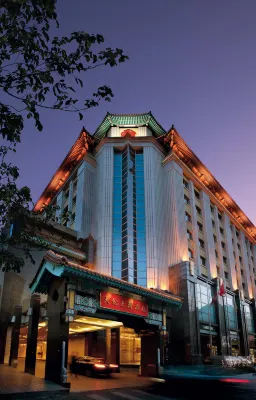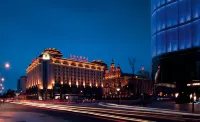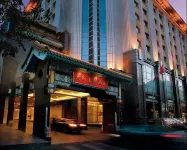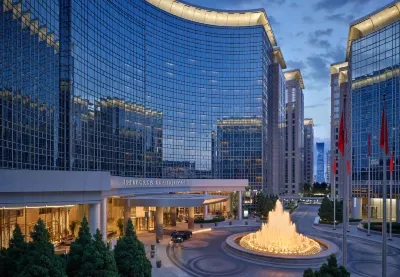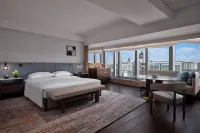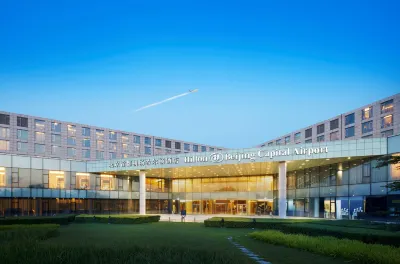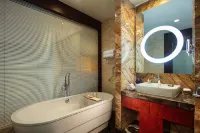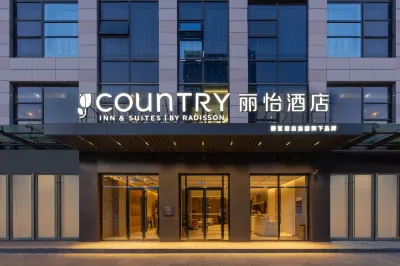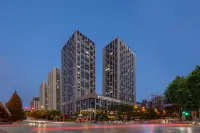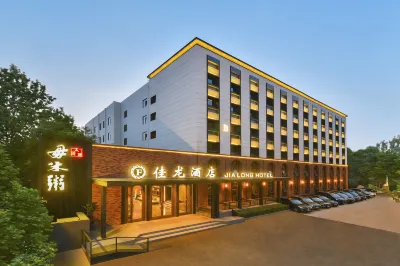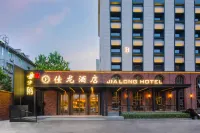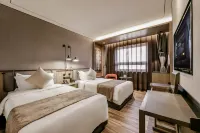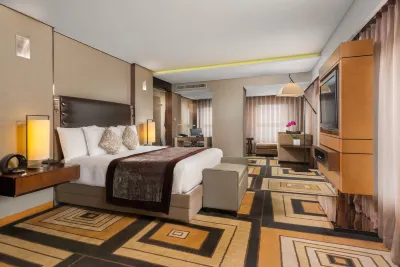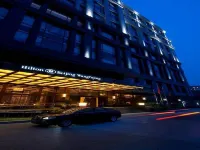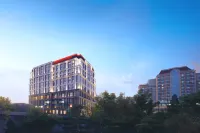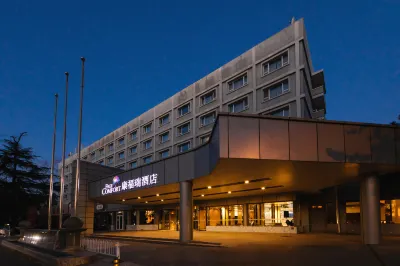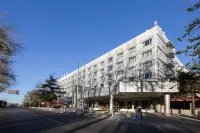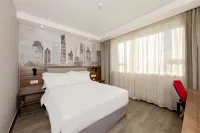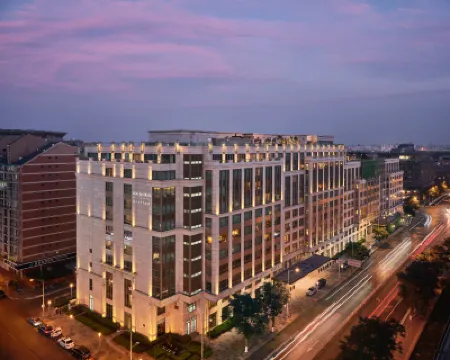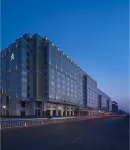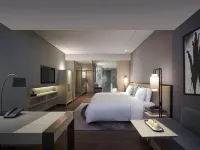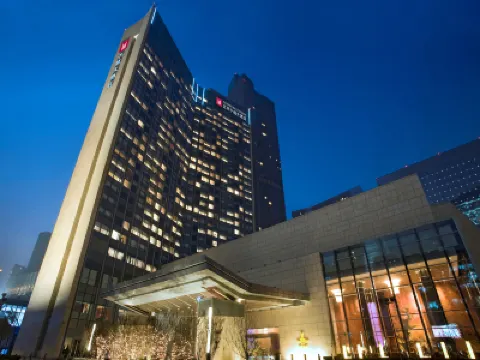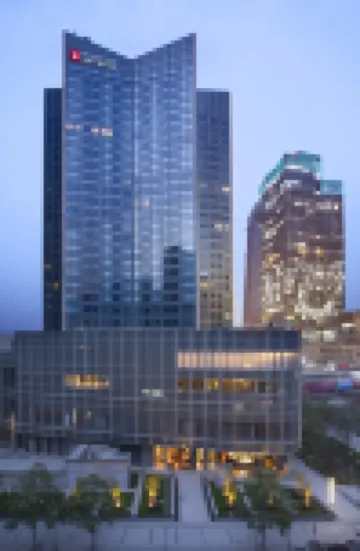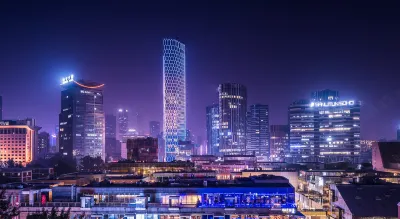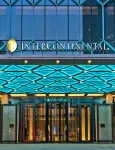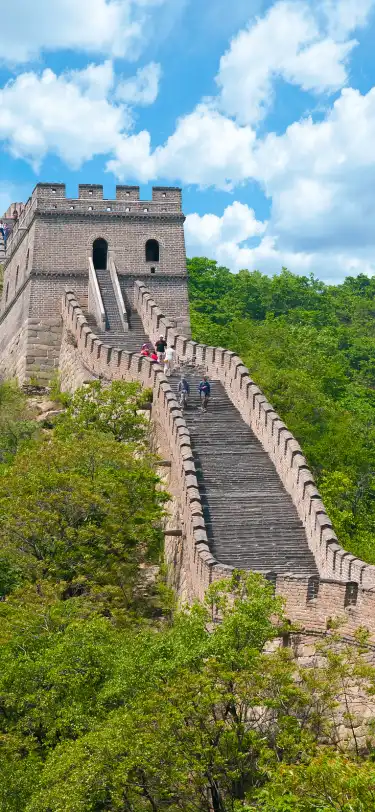
Hotels With Spa in Beijing, China
Enter your dates for the latest hotel rates and availability.
Swipe down to view more
Filter by:
Hotel Star Rating
≤2345
Guest Rating
9+8+7+6+Top Hotels With Spa - Beijing
Choose your travel dates to see the latest prices
Most Booked
Lowest price
Closest to downtown
Highest Rated
Hotel near Tian'anmen Square and Wangfujing Area,Beijing 1.1% of visitors choose this area
MM875263**** 2026.01.11
The room was spotless and tidy; the cleaning staff came every day to make sure everything was sparkling clean and replaced all our amenities. The hotel's location is excellent, very close to Wangfujing shopping area and the Forbidden City. A special shout-out to Apple, the guest relations manager, whose service was exceptional. She was very engaging and shared many recommendations for local food and attractions. She even treated me to afternoon tea, where I enjoyed some fruit and tea. Seeing that I was alone, she kindly kept me company and chatted with me. She also helped me resolve an issue with my parcel by contacting the courier company. Furthermore, she proactively helped me carry my luggage to the car. I'm incredibly grateful!
Very Good
1776 reviews
9.2/10
Price from
MYR 346
per night
Hotel near Tian'anmen Square and Wangfujing Area,Beijing 1.1% of visitors choose this area
GGuest User 2026.02.16
The service was attentive and warm, and the pool was huge and absolutely stunning. The buffet offered a wide variety of dishes, and the fresh-squeezed juice was a big hit with the kids. We even signed up for a membership! On our way out, we grabbed some macarons from the lobby pastry shop. We'll definitely be back for another stay, eat, and play experience when we have the chance.
Outstanding
9167 reviews
9.4/10
Price from
MYR 755
per night
Hotel near Capital Airport and New International Exhibition Center,Beijing
GGuest User 2026.02.15
Right at the start of the year, we met a wonderful person, Manager Min. I had originally booked a deluxe twin room, but he thought it wouldn't be comfortable enough for me and my three children, so he upgraded us to a deluxe duplex suite with a large bathroom and two bathtubs – so thoughtful! A special thank you to him. The environment is just as pictured. The service was incredibly patient and comprehensive. We ordered takeout, and the delivery driver just dropped it off haphazardly and left. The staff helped us search for it everywhere and then delivered it to our room, showing immense patience. 101 thumbs up! From now on, Hilton will be our first choice for travel – a great brand. I want to specifically mention the upgraded room. Since we're from the south, we're quite particular about Feng Shui. When he offered the upgrade, I specifically asked if it was a room at the end of the corridor, as I wouldn't want it, no matter how luxurious. He assured me it wasn't, and it was actually the very first room. That's fantastic! Thank you!
Outstanding
4525 reviews
9.5/10
Price from
MYR 323
per night
Hotel near Jinsong and Panjiayuan Area,Beijing
GGuest User 2026.01.25
They have a self-service beverage bar with a coffee machine, tea dispenser, and a snack stand, which really highlights the service-oriented nature of the space. The service was excellent; the front desk staff were very patient and friendly, communication was seamless, and they truly understood customer needs. The room facilities were all comprehensive. It was a great experience coming here.
Excellent
5185 reviews
9.6/10
Price from
MYR 223
per night
Hotel near East Second Ring Workers' Stadium Area,Beijing 7.8% of visitors choose this area
__FL271770**** 2025.12.09
The lady at the front desk was so thoughtful and proactively upgraded my room. The room facilities were also quite good. What truly deserves praise is the breakfast; while the variety might not match a five-star hotel, the quality, service, and facilities were all excellent.
Good
1153 reviews
9.1/10
Price from
MYR 202
per night
Hotel near Tian'anmen Square and Wangfujing Area,Beijing 1.1% of visitors choose this area
GGuest User 2026.02.15
Service: Nicole Liu provided excellent service! Her directions to the room and explanations of the location were incredibly detailed, making for smooth and pleasant communication. Since the air conditioning isn't available in winter to maintain a constant room temperature, and I found it a bit warm, the front desk immediately sent up a portable air conditioner after I spoke with them. Also, a tall male staff member in the lobby, whose name I didn't catch, overheard my mother and me looking for a convenience store and proactively gave us directions! This saved us from having to walk around outside in the cold — thank you! 🙏
Facilities: The iPad control for lights and curtains was very convenient.
Environment: Great
Hygiene: Excellent
Very Good
5364 reviews
9.2/10
Price from
MYR 535
per night
Hotel near Capital Airport and New International Exhibition Center,Beijing
MM498080**** 2026.01.13
The room was spotless, and the king-size bed was incredibly comfortable with light and soft bedding. The staff were friendly, and the breakfast was delicious. I visited in winter, and the room temperature was perfect; despite the cold Beijing winter outside, I felt warm and cozy both physically and mentally as soon as I stepped into the hotel.
Very Good
1934 reviews
9.3/10
Price from
MYR 150
per night
Hotel near Qianmen, The Temple Of Heaven and Chongwenmen,Beijing 8.5% of visitors choose this area
AAnonymous User 2026.02.01
The hotel's location is excellent, just a ten-minute walk from the Temple of Heaven Park, making it super convenient for visiting nearby attractions and museums. When I checked in, they even upgraded my room! It had a built-in walk-in closet, which was perfect for hanging all my winter clothes, both inside and out. The hotel's buffet dinner was also great and offered excellent value for money. I'd definitely come back again if I get the chance.
Outstanding
2296 reviews
9.5/10
Price from
MYR 441
per night
Hotel near International Trade CBD/Chaoyang Joy City,Beijing 4.4% of visitors choose this area
DDavid.Will.H 2026.01.16
This stay was fantastic! The hotel's location is super convenient, right outside a shopping district and subway station. The front desk staff were warm and attentive, and check-in was incredibly fast. The room was clean and tidy, the bedding soft and comfortable, and it was so quiet at night that I slept soundly until morning. The breakfast had a great variety of Chinese and Western options, and tasted delicious. I'll definitely choose this place again on my next visit!
5928 reviews
8.8/10
Price from
MYR 438
per night
Hotel near East Second Ring Workers' Stadium Area,Beijing 7.8% of visitors choose this area
WWangRuaiRuai 2026.02.14
1: The front desk staff who checked me in, wearing teal eyeshadow, kept a straight face and emphasized three times that I needed to keep the executive lounge schedule and adhere to its times. Excuse me, is this my first time visiting an executive lounge? And second, I'm not blind or deaf, so I would have understood after you said it once. Also, please fix your makeup.
2: After being in the room for a while, I noticed a yellow stain on a pillowcase. I called, and the attendant quickly came to replace it. It's no exaggeration to say she replaced the pillowcase in 2 seconds. This was, without a doubt, the best experience of my stay.
3: As part of the executive benefits, I had a late check-out until 4 PM. However, at 2 PM, my card stopped working. My three-year-old and I were stuck in the elevator, unable to go up, and he got scared. It was then that I realized they might have deactivated my card... We had to go back to the front desk on the ground floor to resolve it. All of this is fine, these are minor issues.
4: They charged me 3500 for check-in and took the deposit quickly. But getting the deposit back was a different story. I've stayed at so many five-star platinum and diamond hotels, and I've always received my deposit before even leaving the hotel entrance. This is the first time I've encountered not receiving it after 12 hours. Customer service told me it would be returned via the original payment method within 48 hours... I've truly never heard of a deposit being delayed like this.
5: The shower in the room was very cold, and at night, it was extremely hot, making it hard to sleep. The breakfast was decent but didn't offer much. Please stop serving that 'cheong fun' (rice noodle roll); it's an embarrassment. Anyone who has ever had 'cheong fun' would know what I'm talking about... The executive lounge had almost nothing to eat; it was far too little, not even half of what you'd find at a Ritz. The orange juice was good. There was one young male server in the executive lounge who was absolutely the best; the other female staff were just props. That's all.
Very Good
5710 reviews
9.3/10
Price from
MYR 871
per night
Recent Reviews for Beijing Hotels
See all
8.8/10
DDavid.Will.HThis stay was fantastic! The hotel's location is super convenient, right outside a shopping district and subway station. The front desk staff were warm and attentive, and check-in was incredibly fast. The room was clean and tidy, the bedding soft and comfortable, and it was so quiet at night that I slept soundly until morning. The breakfast had a great variety of Chinese and Western options, and tasted delicious. I'll definitely choose this place again on my next visit!
Grand Millennium Beijing
Hotel near International Trade CBD/Chaoyang Joy City, Beijing
Price per night from:MYR 438
9.2/10
Very Good
CCallum McNeill-KeayI found the Grand Concordia Hotel to be a solid and well-rounded five-star property that caters effectively to both business and leisure travelers. Located in Beijing’s Chaoyang district, the hotel combines traditional elegance with practical amenities, making it particularly suitable for official visits, business travel, and longer stays.
📍 Location & Accessibility
From my experience, the hotel’s location on Xiaoyun Road in Chaoyang District is one of its key strengths. Being close to several embassies, commercial offices, and popular areas such as Sanlitun and Solana made getting around relatively convenient. While it is not in the immediate city-center tourist zone, I found transport straightforward, with taxis readily available and metro access within walking distance. This location worked especially well for business-related commitments and appointments.
🛏️ Rooms & Comfort
The room I stayed in was spacious, clean, and comfortable, offering a calm and private environment after a busy day. The bed was particularly comfortable, and I appreciated the well-thought-out lighting and overall room layout. Amenities such as reliable Wi-Fi, air conditioning, and a minibar added to the sense of convenience.
That said, I did notice that some elements of the room décor and technology felt slightly dated. While everything functioned well, a refresh in certain areas would further elevate the overall experience. Nonetheless, the room met my expectations for comfort and cleanliness.
🍽️ Dining & Facilities
The hotel offers a good range of on-site dining options, and I found the breakfast buffet to be varied and well-organized. The café and lounge areas provide comfortable spaces for informal meetings or relaxing in the evening.
I also made use of the fitness and leisure facilities, including the gym and swimming pool, which were well maintained and easy to access. In addition, the hotel’s extensive meeting and event spaces clearly make it well suited for conferences, corporate functions, and formal gatherings.
🤝 Service & Staff
Service throughout my stay was professional and courteous. Staff at reception and guest services were attentive and helpful, particularly during check-in and with general inquiries. While there were occasional minor communication challenges, these did not significantly impact my stay and were handled with patience and professionalism.
📊 Overall Value & Impression
Overall, I felt that the Grand Concordia Hotel offers strong value, especially for business travelers or guests with embassy-related or professional engagements in Chaoyang. Its strengths lie in its location, room size, cleanliness, and comprehensive facilities. Although certain aspects of the hotel would benefit from modernization, the overall experience was comfortable, reliable, and well managed.
📌 Who I Would Recommend It For
I would recommend this hotel for:
• Business and diplomatic travelers
• Guests seeking spacious rooms and full hotel facilities
• Longer stays where comfort and practicality matter
It may be less ideal if:
• You are looking for a highly modern or boutique-style hotel
• You want to be within walking distance of major tourist attractions
•
⭐ Final Thoughts
From my perspective, the Grand Concordia Hotel delivers a dependable and comfortable stay with a strong focus on service and functionality. While there is room for modernization, the hotel succeeds in providing a professional, well-maintained, and welcoming environment. I would consider staying here again, particularly for business or extended visits in Beijing.
9.6/10
Excellent
GGuest UserThe breakfast spread was incredibly generous, and the room decor was exquisite. The night view of Jianguomenwai Street was absolutely stunning. Even though the hotel shows a bit of age, the sense of luxury is still incredibly strong. The Chinese restaurant on the third floor offers a wide variety of choices, making for a truly excellent experience! I will definitely be back; it's one of the most ideal places to stay when visiting Beijing!
Beijing Wanda Vista Hotel
Hotel near International Trade CBD/Chaoyang Joy City, Beijing
Price per night from:MYR 459
9.8/10
Perfect
__M1363120****Really enjoyed my staycation at the Mandarin Hutong with my favorite person. We booked the hotel's basic room type, and the hotel generously offered a complimentary two-level upgrade at check-in. During our stay, they also provided tea and bottled water for brewing it. The room itself already came with a wide selection of complimentary soft drinks and a bottle of white wine. Sticking to the principle of not wasting anything, haha, and with a local friend joining us for a game of 'Guandan' (a Chinese card game) in the room, we made sure to fully enjoy all the beverages, trying not to let anything go to waste! 😁
The only minor point of criticism was one of the Mandarin staff members; it seemed like her knowledge of the hotel's room types was less than mine, who just browses forums, which was a bit awkward. 😅
Overall, it was very much worth it. I look forward to coming back here for a second visit with her in a different season in the future.
Mandarin Oriental Qianmen,Beijing
Hotel near Qianmen, The Temple Of Heaven and Chongwenmen, Beijing
Price per night from:MYR 6,269
9.3/10
Very Good
WWangRuaiRuai1: The front desk staff who checked me in, wearing teal eyeshadow, kept a straight face and emphasized three times that I needed to keep the executive lounge schedule and adhere to its times. Excuse me, is this my first time visiting an executive lounge? And second, I'm not blind or deaf, so I would have understood after you said it once. Also, please fix your makeup.
2: After being in the room for a while, I noticed a yellow stain on a pillowcase. I called, and the attendant quickly came to replace it. It's no exaggeration to say she replaced the pillowcase in 2 seconds. This was, without a doubt, the best experience of my stay.
3: As part of the executive benefits, I had a late check-out until 4 PM. However, at 2 PM, my card stopped working. My three-year-old and I were stuck in the elevator, unable to go up, and he got scared. It was then that I realized they might have deactivated my card... We had to go back to the front desk on the ground floor to resolve it. All of this is fine, these are minor issues.
4: They charged me 3500 for check-in and took the deposit quickly. But getting the deposit back was a different story. I've stayed at so many five-star platinum and diamond hotels, and I've always received my deposit before even leaving the hotel entrance. This is the first time I've encountered not receiving it after 12 hours. Customer service told me it would be returned via the original payment method within 48 hours... I've truly never heard of a deposit being delayed like this.
5: The shower in the room was very cold, and at night, it was extremely hot, making it hard to sleep. The breakfast was decent but didn't offer much. Please stop serving that 'cheong fun' (rice noodle roll); it's an embarrassment. Anyone who has ever had 'cheong fun' would know what I'm talking about... The executive lounge had almost nothing to eat; it was far too little, not even half of what you'd find at a Ritz. The orange juice was good. There was one young male server in the executive lounge who was absolutely the best; the other female staff were just props. That's all.
InterContinental Hotels BEIJING SANLITUN by IHG
Hotel near East Second Ring Workers' Stadium Area, Beijing
Price per night from:MYR 871
9.4/10
Outstanding
WWenjingJavelinComing to Beijing for Chinese New Year? Staying here is a great choice!
This is likely the only Regent in Beijing, and its location is prime, right near the Wangfujing commercial district. It's super convenient for exploring Wangfujing or the Forbidden City, and there's a direct subway connection nearby.
Regent's service has always been excellent. First, a big thanks to Bianca Hong for handling my check-in, and Amelia Song, who I met during check-out. Both were incredibly nice and professional staff members.
The junior suite offers quite spacious accommodations, with a sitting area that's also suitable for working on a laptop.
The bed is very comfortable~ The bathroom is well-designed with wet and dry separation, a bathtub, and double sinks, so two people can stay without any hassle. There's even a half-bath by the entrance, which is very convenient.
Regent's most famous feature is probably the 17th-floor lounge breakfast. If you have lounge access, definitely don't miss it. It's a mix of à la carte and buffet options, with plenty of delicious choices.
The gym space is also excellent, and there's a 25-meter swimming pool. The facilities for exercise and relaxation are top-notch.
Regent Beijing
Hotel near Tian'anmen Square and Wangfujing Area, Beijing
Price per night from:MYR 667
9.5/10
Outstanding
YYifeiGGThe hotel room was really spacious, and I loved the tea table setup. It was also very affordable, and the facilities were excellent, with a smart toilet, a large-screen TV, and a smart voice system. Plus, about 500 meters downstairs is Lianhua Pond Park, which has an ice rink. Although it's small, there are very few people, so you don't have to deal with the crowds at the Summer Palace ice rink. The only thing I couldn't stand was that the heating couldn't be adjusted – it was ridiculously hot. The air conditioning was disabled, so there was no way to control the room temperature. I tried opening the window, but it still didn't help. This place is perfect for those who don't mind heat or those who get cold easily, but I really struggled with the heat.
9.4/10
Outstanding
11891037****The hotel environment is great, especially the bathtub which was incredibly comfortable – one of the best I've ever soaked in. The service was also very good, and everything was clean. They even had a humidifier, and the room was nice and warm. It's a shame the window couldn't open. I'll definitely come back to treat myself when I need a break.
Pan Pacific Beijing(Near Tian‘anmen square and Forbidden City)
Hotel near Xidan and Financial Street Area, Beijing
Price per night from:MYR 606
9.3/10
Very Good
11860103****Although the suite isn't huge, the room layout is very practical. Having two bathrooms, one for guests and one en-suite, is a thoughtful touch. The pillows in the bedroom are incredibly comfortable; the slow-rebound firm latex is perfect for anyone with neck issues. There's also a wall-mounted bench along the bed, great for sitting or placing items. The handheld showerhead had a slight buildup of limescale, causing the water to spray out a bit, so I'd suggest a quick descaling. Also, the toilet costing 18,000 was truly astonishing! Overall, a very good stay.
9.3/10
Very Good
LLingzidekafeiI booked a suite, and the room was spacious with decent bedding, and the service was good. However, the lobby, the breakfast restaurant on the basement floor, and the dinner restaurant on the second floor were all incredibly cold. I had to eat wearing a coat! Are they that stingy with the air conditioning?
Also, the colorful lights on the bedroom TV wall and headboard made it look like a KTV, it was quite startling at night. What kind of design is this? Is there no sense of aesthetics? I've stayed in many hotels, but this is the first time I've seen such a gaudy headboard – it was really creepy.
The electric curtain switches were broken, so one large curtain couldn't close. I couldn't even close it manually because the sofa was right against the window… Speechless.
The afternoon tea looked nice but tasted terrible. The lion and turret were made into big chocolate lumps, there wasn't a single slice of cake, and there were four rock-hard scones. Apart from the fruit, nothing was good. It was so subpar and didn't match the price.
In summary, aside from the large room and good hygiene, the hotel lacked character and felt very dated. I wouldn't recommend it for the price.
I strongly suggest immediately removing the red and blue background wall and fixing the electric curtains!
Sofitel Beijing Central
Hotel near International Trade CBD/Chaoyang Joy City, Beijing
Price per night from:MYR 396
Frequently Asked Questions
How do I book a hotel on Trip.com?
To book a hotel on Trip.com, simply enter your destination, travel dates, and the number of guests on the page. Then, browse through the available hotels and select the one you want to book. Follow the prompts to enter your payment information and complete the booking.
How to get cheap hotels on Trip.com?
There are several ways to discover affordable hotels on Trip.com. You can narrow down your search results by filtering hotels according to your preferred price range, or you can sort the results by price to view the least expensive options first.
Where can I find hotel deals on Trip.com?
Trip.com offers a diverse selection of hotel deals and promotions that are available throughout the year. You can easily find these special offers on our deals page. Moreover, if you are a member of our loyalty program, you can log in to your account and discover exclusive discounted rates at hotel list pages.
What is the way to get lower prices at hotels?
Sometimes booking hotels in midweek is cheaper, but it also depends on the season.
How many hotels are listed in Trip.com?
There are over 1,500,000 hotels in more than 230 countries or regions on Trip.com. Don't know which hotel to book? Browse the site to get ideas!
Can I cancel or change my hotel reservation on Trip.com?
It depends on the hotel policy and cancellation date. Kindly check the policy section of related hotel pages. To cancel or change your reservation, log in to your trip.com account, go to "My Bookings," and follow the instructions.
How do I contact trip.com customer service?
You can contact trip.com 24/7 customer service by visiting the trip.com help center and submitting a support request. You can also contact them by phone or chat, depending on your location.
Property Information for Tourists
| Total Properties | 115 |
|---|---|
| Number of Reviews | 269,397 |
| Weekday Avg. Price | MYR 1,885 |
| Weekend Avg. Price | MYR 1,923 |
Top Recommendations
Find More Hotels with Facilities
Hotels with Spa in JaipurHotels with Spa in PuriHotels with Bar in DohaHotels with Balcony in Hong KongHotels with Bar in Clark CountyHotels with Bar in Chatelaillon-PlageHotels with Bar in Saint-Germain-en-LayeHotels with Bar in Pompano BeachHotels with Bar in SeinajokiHotels with Bar in CamposHotels in Central Abaco With BreakfastHotels in Bavaria With Swimming PoolsHotels in Noord-Brabant With Swimming PoolsHotels in Baden-Wurttemberg With SpasHotels in South Dakota With Wi-FiHotels in Bavaria With BreakfastHotels in Jiangxi With BarsHotels in Macau With BarsHotels in Hainan With BarsHotels in Santiago del Estero With Bars
Best Selling Hotel Gallery
Hotels in Kelantan With SpasHotels in Uttar Pradesh With BreakfastHotels in Canton of Basel-Landschaft With BarsHotels in Lampung With BreakfastHotels in Granada With Swimming PoolsHotels in La Massana With SpasHotels in Eastern With BarsHotels in Ibaraki Prefecture With BarsHotels in Exuma With BreakfastHotels in Hakkari Province With BreakfastHotels in Ile-de-France With BarsHotels in Perak With GymsHotels in Beni Mellal-Khenifra With BreakfastHotels in Kutahya Province With BreakfastHotels in Magdalena With Swimming PoolsHotels with Spa in OstvorpommernHotels with Gym in Palm HarborHotels with Gym in KapoleiHotels with Gym in Tompkins CountyHotels with Parking in Gallatin County
